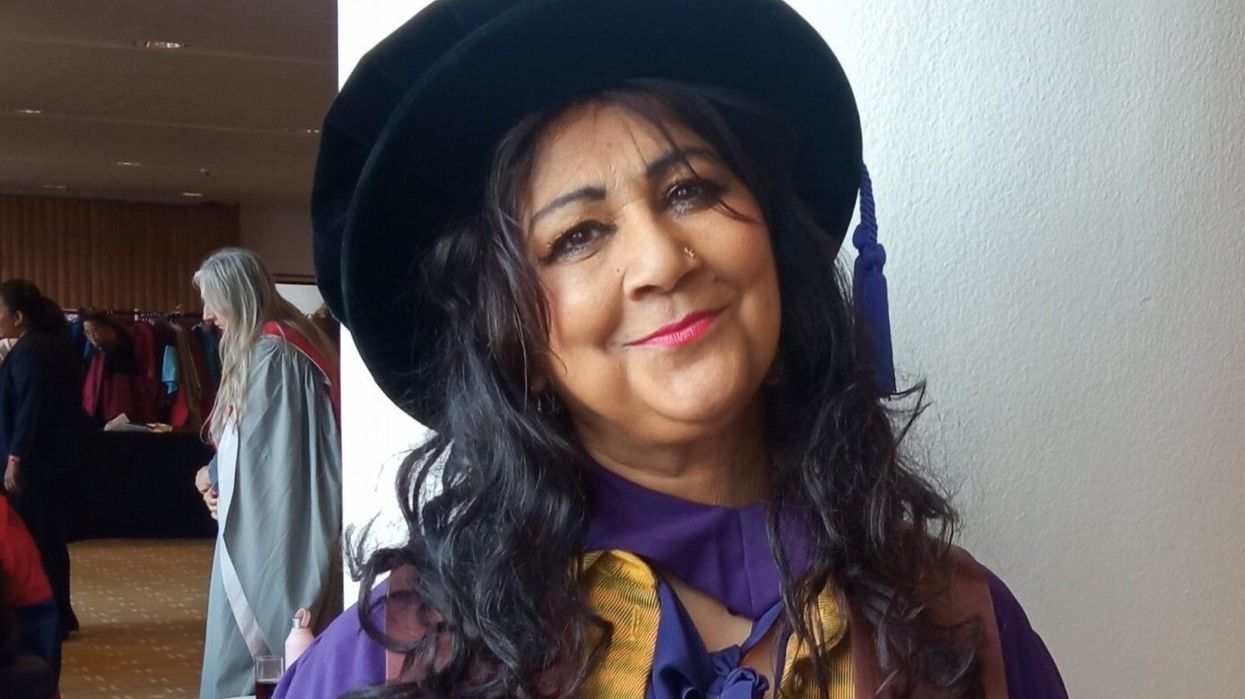THE artist Chila Burman has been given an honorary degree by University College London, one of the top universities in the country, for making “an extraordinary contribution to her field”.
The ceremony, in which she was made an honorary Doctor of Literature, was held at the Royal Festival Hall, filled with academics and students.
Burman was born in Bootle, near Liverpool, in 1957. She attended Bootle’s Girl Grammar School, and switched at 13 to Waterloo Park Grammar School for Girls, where a teacher encouraged her after spotting her talent for art.
She knew it was risky, but Burman took up art as a career 50 years ago, after doing an art and design foundation course at Southport College of Art. She then studied fine art and graphic design at Leeds Polytechnic and later ventured to London to the highly selective Slade School of Fine Art, where she got her MA in printmaking and painting in 1982.
The citation was read by Mary Evans, herself a contemporary artist and lecturer and the first black director of Slade School of Fine Art, part of University College London (UCL).
Her words summed up Burman’s rich and varied career – in 2023, she won Eastern Eye’s Arts Culture & Theatre Award (ACTA) in the arts category.
Evans said: “Chila is a celebrated artist whose works examine representation, gender and cultural identity. Born in Merseyside to Punjabi-Hindu parents, she was a key figure in the British black arts movement in the 1980s and has made an extraordinary contribution to her field.
Receiving the honorary degreefrom University College London“Her works have been exhibited in galleries across the world and are in many permanent collections in the UK, including those of the Tate, Wellcome Trust, British Council, and the V&A and Science Museums.
“Shaped by her upbringing, Chila has continually broken stereotypes, freeing the image of women through her work in printmaking, painting, installation and film. In particular, she has repeatedly challenged stereotypical assumptions of Asian women, often using self-portraiture.
“Her work is informed by Bollywood, fashion and found objects, as she explores gender and identity politics, the celebration and politics of femininity, and the relationship between popular culture and high art.
“Chila’s artwork for public spaces across the UK has had tremendous impact. Her hugely popular installation on the facade of Tate Britain in late 2020 – featuring Hindu deities, fireworks and a fluorescent ice-cream van – lit up that part of London and conveyed a powerful message of hope amid the darkness of lockdown.
“The van was a reference to the ice-cream business that her father set up, while the saturated colours and symbolism of her Indian culture have been a recurring feature in her work.
“As an alumna of the Slade, we were delighted when in 2022, Chila hosted an online contemporary art lecture for our students.”
Evans emphasised: “We know that women of colour are under-represented in the field of art. The National Museum of Women in the Arts records that 51 per cent of visual artists today are women. But when it comes to exhibitions and gallery representation, there is a less optimistic story. In London, 78 per cent of the galleries represent more men than women, while only five per cent represent an equal number of male and female artists.”
She went on: “As a leading art school with an international reputation, the Slade acknowledges its responsibility to diversify the talent pipeline and it continues to prioritise widening participation activity. Recognising and celebrating the work of our alumni community within under-represented groups, including those such as Chila, whose work challenges societal stereotypes, is a vitally important aspect of this mission.
“Chila’s influence has already been recognised with many accolades, including an honorary doctorate, and fellowship, from the University of the Arts London.
“In 2020 she was invited into the Art Workers’ Guild as a Brother and in 2022, she was awarded an MBE in the Queen’s Jubilee birthday honours for services to the visual arts.
“In recognition of her cultural impact and inspiring influence in her field, president and provost, it is a pleasure to present Chila Kumari Singh Burman for conferment of an honorary degree of D(Lit) at UCL.”
Burman’s response was both emotional and playful. At times, she seemed almost lost for words, wondering several times: “What can I say?”
She did say: “I mean I’m totally over the moon. I’m sure my mum and dad in their heavens would be knocked out.”
She recalled her past: “I wish you all the best. I know these are tough times, turbulent times, and it’s quite difficult when you first leave, because I didn’t quite know what to do myself when I finished the Slade. Don’t ever forget University College London, all your tutors who helped you get to where you all are. Because I have stayed friends with quite a few of them to the present day. They helped guide me at the start of my journey.
“Always be kind to each other. Keep your spirits up, exercise, then sleep a lot. Eat healthy food if you can, some dal and sabji and some stuff like that.
“Although we’re going through some tough times, you know there is light ahead of you. Always keep true to yourself. Have fun. Work hard.




